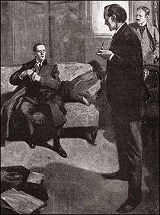And yet, as he had guessed, the game was not over yet. There was another hand to be played, and yet another and another. Ted Baldwin, for one, had escaped the scaffold; so had the Willabys; so had several others of the fiercest spirits of the gang. For ten years they were out of the world, and then came a day when they were free once more - a day which Edwards, who knew his men, was very sure would be an end of his life of peace. They had sworn an oath on all that they thought holy to have his blood as a vengeance for their comrades. And well they strove to keep their vow!
From Chicago he was chased, after two attempts so near success that it was sure that the third would get him. From Chicago he went under a changed name to California, and it was there that the light went for a time out of his life when Ettie Edwards died. Once again he was nearly killed, and once again under the name of Douglas he worked in a lonely cañon, where with an English partner named Barker he amassed a fortune. At last there came a warning to him that the bloodhounds were on his track once more, and he cleared - only just in time - for England. And thence came the John Douglas who for a second time married a worthy mate, and lived for five years as a Sussex county gentleman, a life which ended with the strange happenings of which we have heard.
THE POLICE trial had passed, in which the case of John Douglas was referred to a higher court. So had the Quarter Sessions, at which he was acquitted as having acted in self-defense.
“Get him out of England at any cost,” wrote Holmes to the wife. “There are forces here which may be more dangerous than those he has escaped. There is no safety for your husband in England.”
Two months had gone by, and the case had to some extent passed from our minds. Then one morning there came an enigmatic note slipped into our letterbox. “Dear me, Mr. Holmes. Dear me!” said this singular epistle. There was neither superscription nor signature. I laughed at the quaint message; but Holmes showed unwonted seriousness.
“Deviltry, Watson!” he remarked, and sat long with a clouded brow.
Late last night Mrs. Hudson, our landlady, brought up a message that a gentleman wished to see Holmes, and that the matter was of the utmost importance. Close at the heels of his messenger came Cecil Barker, our friend of the moated Manor House. His face was drawn and haggard.

“I’ve had bad news - terrible news, Mr. Holmes,” said he.
“I feared as much,” said Holmes.
“You have not had a cable, have you?”
“I have had a note from someone who has.”
“It’s poor Douglas. They tell me his name is Edwards; but he will always be Jack Douglas of Benito Cañon to me. I told you that they started together for South Africa in the Palmyra three weeks ago.”
“Exactly.”
“The ship reached Cape Town last night. I received this cable from Mrs. Douglas this morning:
Jack has been lost overboard in gale off St. Helena. No one knows how accident occurred.
IVY DOUGLAS.
“Ha! It came like that, did it?” said Holmes thoughtfully. “Well, I’ve no doubt it was well stage-managed.”
“You mean that you think there was no accident?”
“None in the world.”
“He was murdered?”
“Surely!”
“So I think also. These infernal Scowrers, this cursed vindictive nest of criminals- -”
“No, no, my good sir,” said Holmes. “There is a master hand here. It is no case of sawed-off shotguns and clumsy six-shooters. You can tell an old master by the sweep of his brush. I can tell a Moriarty when I see one. This crime is from London, not from America.”
“But for what motive?”